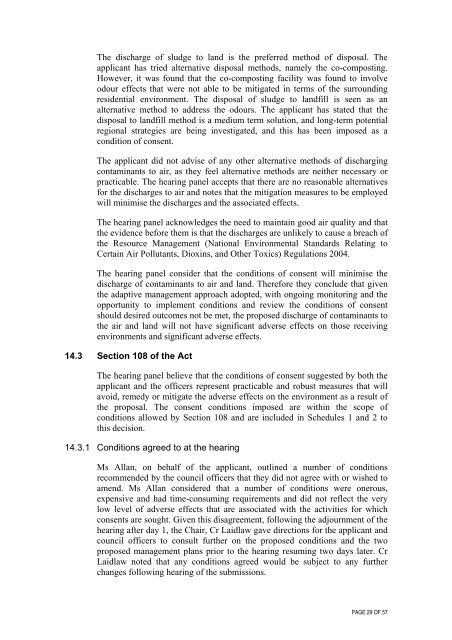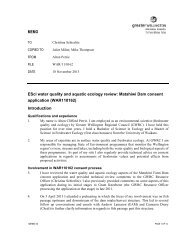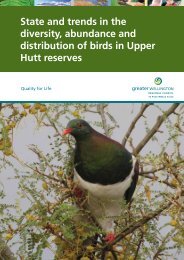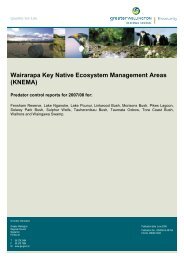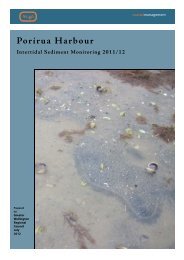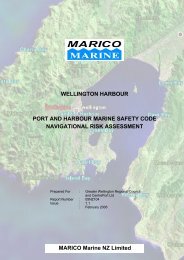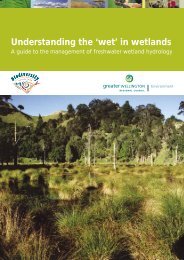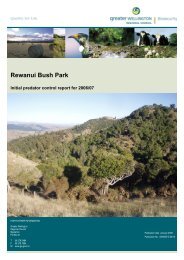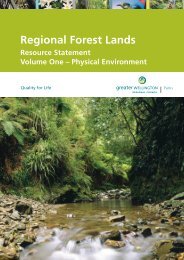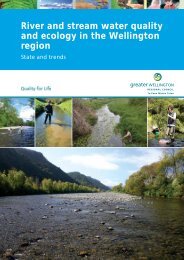Decision report- Carey's Gully Sludge Dewatering Facility - Greater ...
Decision report- Carey's Gully Sludge Dewatering Facility - Greater ...
Decision report- Carey's Gully Sludge Dewatering Facility - Greater ...
Create successful ePaper yourself
Turn your PDF publications into a flip-book with our unique Google optimized e-Paper software.
The discharge of sludge to land is the preferred method of disposal. The<br />
applicant has tried alternative disposal methods, namely the co-composting.<br />
However, it was found that the co-composting facility was found to involve<br />
odour effects that were not able to be mitigated in terms of the surrounding<br />
residential environment. The disposal of sludge to landfill is seen as an<br />
alternative method to address the odours. The applicant has stated that the<br />
disposal to landfill method is a medium term solution, and long-term potential<br />
regional strategies are being investigated, and this has been imposed as a<br />
condition of consent.<br />
The applicant did not advise of any other alternative methods of discharging<br />
contaminants to air, as they feel alternative methods are neither necessary or<br />
practicable. The hearing panel accepts that there are no reasonable alternatives<br />
for the discharges to air and notes that the mitigation measures to be employed<br />
will minimise the discharges and the associated effects.<br />
The hearing panel acknowledges the need to maintain good air quality and that<br />
the evidence before them is that the discharges are unlikely to cause a breach of<br />
the Resource Management (National Environmental Standards Relating to<br />
Certain Air Pollutants, Dioxins, and Other Toxics) Regulations 2004.<br />
The hearing panel consider that the conditions of consent will minimise the<br />
discharge of contaminants to air and land. Therefore they conclude that given<br />
the adaptive management approach adopted, with ongoing monitoring and the<br />
opportunity to implement conditions and review the conditions of consent<br />
should desired outcomes not be met, the proposed discharge of contaminants to<br />
the air and land will not have significant adverse effects on those receiving<br />
environments and significant adverse effects.<br />
14.3 Section 108 of the Act<br />
The hearing panel believe that the conditions of consent suggested by both the<br />
applicant and the officers represent practicable and robust measures that will<br />
avoid, remedy or mitigate the adverse effects on the environment as a result of<br />
the proposal. The consent conditions imposed are within the scope of<br />
conditions allowed by Section 108 and are included in Schedules 1 and 2 to<br />
this decision.<br />
14.3.1 Conditions agreed to at the hearing<br />
Ms Allan, on behalf of the applicant, outlined a number of conditions<br />
recommended by the council officers that they did not agree with or wished to<br />
amend. Ms Allan considered that a number of conditions were onerous,<br />
expensive and had time-consuming requirements and did not reflect the very<br />
low level of adverse effects that are associated with the activities for which<br />
consents are sought. Given this disagreement, following the adjournment of the<br />
hearing after day 1, the Chair, Cr Laidlaw gave directions for the applicant and<br />
council officers to consult further on the proposed conditions and the two<br />
proposed management plans prior to the hearing resuming two days later. Cr<br />
Laidlaw noted that any conditions agreed would be subject to any further<br />
changes following hearing of the submissions.<br />
PAGE 29 OF 57


